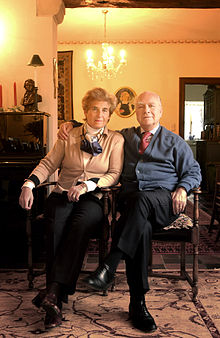Mark Eyskens
Belgian politician
Marc Maria Frans, Viscount Eyskens (born 29 April 1933) is a Belgian economist and politician in the Christian People's Party (Belgium), now called Christian Democratic and Flemish and briefly served as Prime Minister of Belgium in 1981.


Quotes
edit- Europe is an economic giant, a political dwarf, and a military worm.
- As quoted by Craig R. Whitney in WAR IN THE GULF: EUROPE; Gulf Fighting Shatters Europeans' Fragile Unity, The New York Times, January 25th, 1991. This phrase was pronounced in January 1991, a few days before the beginning of Desert Storm, while Eyskens was the Foreign Minister of Belgium.
- The journey was a real triumph. To the Congolese, he almost seemed like an extraterrestrial apparition. The reception was very warm and soon Boudewijn was nicknamed "Bwana Kitoko", "beautiful young man". The young king had a very good feeling about his first Congo experience. Some say it was the first time he laughed in public.
- Baudouin and the Belgian Congo: a futile fight against “evil” Eyskens about King Baudouin's first official visit to the Belgian Congo in 1955.
- I think King Baudouin was not dissatisfied with the disappearance of the man who broke off the 80-year-old relations between Belgium and Congo.
- Baudouin and the Belgian Congo: a futile fight against “evil” Eyskens about the murder of Patrice Lumumba.
- The Belgian government's apologies to Lumumba's family are beside the point. According to the current foreign minister, Louis Michel, the then government should have insisted on a fair trial for Lumumba. But there was no government in Congo then, only chaos. The army mutinied through the provinces, Belgian troops were no longer there, only United Nations soldiers. They should have performed.
- During the Cold War, a division arose between Western and Communist countries. The countries that had just become independent after colonial times had to be kept on friendly terms. That is why Belgium offered development aid to those countries. The government also supported the work of the missionaries who were active in Congo, Rwanda and Burundi, among others.
- Governments of developing countries sometimes proposed projects that did not directly benefit the population, but did benefit the government; the so-called 'white elephants'. For example, they wanted to build highways and build large buildings, while we thought it was better to focus on good education.
- It is difficult to stop aid for human rights violations without the population suffering. That is why we continued to offer help through reliable NGOs. Preference was given to Belgian NGOs, because the domestic NGOs were often under the influence of the Congolese government. The importance of human rights has only increased, partly due to the introduction of the International Criminal Court, which tackles violations of human rights.
- The population of the African continent is expected to grow from 1 to 4 billion people in the next 100 years. This will cause a huge influx of refugees. When you are poor and get older, you need many children to support yourself. The best means of contraception is an increase in prosperity. If we invest enough in Africa now, we can slow down population growth and Africans don't have to come here to survive. Thus charity is also in one's own interest.
- China is operating in Congo in a brutal way that smacks of slavery. Congolese work in mines for very low wages. China is not concerned with sustainability and often commits a predatory economy. The country also does not respect human rights. Still, the developing country's government is letting itself be wrapped up, because the Chinese don't make moral demands like the West does. China works with a closed stock exchange in Congo. For example, they build 20 schools in exchange for being able to operate 10 copper mines for 1 year. But that is often peasant deception: the value of the school buildings is sometimes only 10% of the value of the extracted raw materials.
External links
edit- Archives of Mark Eyskens in ODIS - Online Database for Intermediary Structures
- Official Website of the Global Panel Foundation